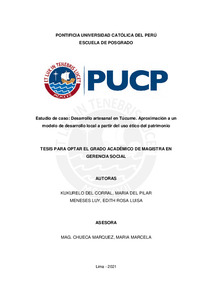| dc.contributor.advisor | Chueca Márquez, María Marcela | |
| dc.contributor.author | Kukurelo del Corral, María del Pilar | |
| dc.contributor.author | Meneses Luy, Edith Rosa Luisa | |
| dc.date.accessioned | 2021-09-02T01:33:57Z | |
| dc.date.available | 2021-09-02T01:33:57Z | |
| dc.date.created | 2021 | |
| dc.date.issued | 2021-09-01 | |
| dc.identifier.uri | http://hdl.handle.net/20.500.12404/20227 | |
| dc.description.abstract | El reconocimiento y valoración del patrimonio cultural, arqueológico e iconográfico del
distrito de Túcume en los últimos veinte años genera oportunidades de desarrollo
sostenible a través de la promoción de la actividad artesanal, la consolidación del capital
social y el fortalecimiento de la identidad local.
La presente investigación analiza y sistematiza los procesos desarrollados en Túcume
que contribuyeron al desarrollo local del sector artesanal. Este desarrollo se evidencia
en la variedad de técnicas y diversidad de productos que actualmente se elaboran, así
como también en el nivel de especialización y calidad de ejecución de las artesanas,
artesanos y artistas contemporáneos locales.
Se identifican los factores claves, actores y condiciones o características internas y
externas del contexto y con todos ellos se propone un modelo de desarrollo local basado
en el patrimonio que pueda ser replicado en contextos de condiciones similares.
Se contrasta el estado del sector artesanal antes del año 2002 con el estado actual al
año 2020, empleando la información de las fuentes directas, de los actores estratégicos
del proyecto AXIS Túcume 2002, también publicaciones académicas como artículos y
tesis sobre el asunto, y también con la información del informe final del proyecto
mencionado.
En el distrito de Túcume la variación de la tendencia productiva fue radical, pasó de no
mirar al patrimonio local a conocerlo, revalorarlo y convertirlo en herramienta clave de
su desarrollo. | es_ES |
| dc.description.abstract | The recognition and appreciation of the cultural, archaeological and iconographic
heritage of the Túcume district in the last twenty years generates opportunities for
sustainable development through the promotion of artisan activity, the consolidation of
social capital and the strengthening of local identity.
This research analyzes and systematizes the processes developed in Túcume that
contributed to the local development of the artisan sector. This development is evident
in the variety of techniques and diversity of products that are currently made, as well as
in the level of specialization and quality of execution of local artisans, artisans and
contemporary artists.
The key factors, actors and conditions or internal and external characteristics of the
context are identified and with all of them a model of local development based on heritage
is proposed that can be replicated in contexts with similar conditions.
The state of the artisanal sector before 2002 is contrasted with the current state in 2020,
using information from direct sources, from the strategic actors of the AXIS Túcume 2002
project, as well as academic publications such as articles and theses on the subject, and
also with the information from the final report of the aforementioned project.
In the district of Túcume, the variation in the productive trend was radical, it went from
not looking at the local heritage to knowing it, revaluing it and turning it into a key tool for
its development. | es_ES |
| dc.language.iso | spa | es_ES |
| dc.publisher | Pontificia Universidad Católica del Perú | es_ES |
| dc.rights | info:eu-repo/semantics/openAccess | es_ES |
| dc.rights.uri | http://creativecommons.org/licenses/by-nc/2.5/pe/ | * |
| dc.subject | Artesanía--Perú--Túcume (Lambayeque : Distrito) | es_ES |
| dc.subject | Artesanos--Perú | es_ES |
| dc.subject | Desarrollo local--Perú | es_ES |
| dc.subject | Patrimonio cultural | es_ES |
| dc.title | Estudio de caso : desarrollo artesanal en Túcume. Aproximación a un modelo de desarrollo local a partir del uso ético del patrimonio | es_ES |
| dc.type | info:eu-repo/semantics/masterThesis | es_ES |
| thesis.degree.name | Maestro en Gerencia Social | es_ES |
| thesis.degree.level | Maestría | es_ES |
| thesis.degree.grantor | Pontificia Universidad Católica del Perú. Escuela de Posgrado. | es_ES |
| thesis.degree.discipline | Gerencia Social | es_ES |
| renati.advisor.dni | 07538016 | |
| renati.advisor.orcid | https://orcid.org/0000-0003-3490-9207 | es_ES |
| renati.author.dni | 08247568 | |
| renati.author.dni | 08266673 | |
| renati.discipline | 314127 | es_ES |
| renati.juror | Vargas Torres, Jorge Ernesto | |
| renati.juror | Chueca Marquez, Maria Marcela | |
| renati.juror | Palacios Cordova, Victor Vicente | |
| renati.level | https://purl.org/pe-repo/renati/level#maestro | es_ES |
| renati.type | http://purl.org/pe-repo/renati/type#tesis | es_ES |
| dc.publisher.country | PE | es_ES |
| dc.subject.ocde | http://purl.org/pe-repo/ocde/ford#5.09.00 | es_ES |






